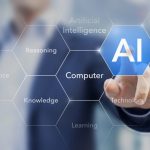AI-powered offline translation comes to Microsoft Translator apps

Having a translation app on your phone is great when you're abroad and want to be able to speak in the local lingo. But if you find yourself without an internet connection, you might struggle to find the words you need.
If you're a Microsoft Translator user, however, this now changes. Microsoft has introduced free, downloadable AI-powered translation packs which the company says brings "the benefit of neural translation technology regardless of whether the device is connected to the cloud or offline".
UK sets out five principles for the ethical use of AI
Breakthrough in AI cuts battery drain of mobile voice UIs

We've become increasingly used to technology that uses 'wake words' like, "Hey, Cortana" to initiate interaction.
But this technology has, so far, failed to make a big impact in the mobile apps arena, the main reason being the battery drain created by having an app that's constantly listening. That could be about to change as Silicon Valley company Sensory is announcing a breakthrough in running its TrulyHandsfree wake word and speech recognition AI engine directly on Android and iOS smartphone applications at low-power.
Microsoft opens up its AI training to the public

Businesses are increasingly interested in the opportunities offered by artificial intelligence across a wide range of uses. But there's an increasing shortage of the skills needed to implement AI.
Microsoft is helping to address this problem by making its AI training program -- the Microsoft Professional Program in AI, previously only available to employees -- open to the public.
New developer tool aids deployment of AI applications

There's increasing demand for AI and machine learning solutions from businesses, but often a shortage of skills is holding back implementation.
Cloud computing specialist Paperspace is launching a new tool called Gradient to allow developers to tap into a dedicated cloud of AI solutions for building, training and deploying machine learning applications.
Picking through the haystack -- the role of AI in cyber security [Q&A]

Over the past year or so the idea of using artificial intelligence as an aid to cyber security has gained a lot of support.
But what role does AI and machine learning have, and what will the future of security look like when it's in widespread use? We spoke to Gene Stevens, co-founder and CTO of network security company ProtectWise to find out.
Google launches Mobile Real-time Video Segmentation as limited beta (AI green screen to you and I)

Google is testing a new AI green screen tool for YouTube called Mobile Real-time Video Segmentation. We've become used to every chat tool worth its salt offering AR overlays and masks, but this technology makes it possible to change backgrounds -- in real time.
The technique makes use of neural networks to determine which parts of a scene are foreground to be left alone and which are background to be replaced. No special equipment is needed, and it has the potential to be used for serious videos as well as the more frivolous things masks tend to be used for at the moment.
Prediction #6 -- AI comes of age, this time asking the questions, too

Paul Saffo says that communication technologies historically take 30 years or more to find their true purpose. Just look at how the Internet today is different than it was back in 1988. I am beginning to think this idea applies also to new computing technologies like artificial intelligence (AI). We’re reading a lot lately about AI and I think 2018 is the year when AI becomes recognized for its much deeper purpose of asking questions, not just finding answers.
Some older readers may remember the AI bubble of the mid-1980s. Sand Hill Road venture capitalists invested (and lost) about $1 billion in AI startups that were generally touted as expert systems. An expert system attempted to computerize professional skills like reading mammograms or interpreting oil field seismic logs. Computers were cheaper than medical specialists or petroleum geologists, the startup founders reckoned, so replacing these professionals would not only save money, it would allow much broader application of their knowledge. Alas, it didn’t work for two reasons: 1) figuring-out how experts make decisions was way harder than the AI researchers expected, and; 2) even if you could fully explain the decision-making process it required a LOT more computing power than originally expected. Circa 1985 it probably was cheaper to hire a doctor than to run a program to replace one.
UK should lead the world in safe, ethical AI

Speaking at the World Economic Forum in Davos the UK Prime Minister Theresa May says she wants the country to lead the world in deploying artificial intelligence in a safe and ethical manner.
A new advisory body -- Centre for Data Ethics and Innovation -- will be set up to co-ordinate the UK's efforts with other countries, and the UK will join the Davos forum's own council on artificial intelligence.
Amazon Go, the AI-powered, checkout-free store, is now open in Seattle

Today sees the opening of the first Amazon Go store. The online retailer is looking to change the face of real-world shopping with its AI-powered brick and mortar stores that are free from checkouts and time-consuming lines.
Anyone shopping in the new Seattle store will find that they are constantly monitored by cameras as they shop, with the camera monitoring which items they place in their baskets. Customers are automatically billed when they leave the store.
New AI platform helps companies with GDPR compliance

At the heart of the forthcoming GDPR legislation is the protection of personal data. For businesses this means being able to identify data that’s covered, including where it’s held and how it’s processed.
California-based Algorithmic IT Operations (AIOps) specialist Loom Systems is launching a new platform and virtual IT data analyst that helps users maintain GDPR compliance with just a click of a button.
AI is moving into the enterprise mainstream

Artificial intelligence is often seen as being a technology of the future, but a new study from natural language processing company Narrative Science reveals that 61 percent of businesses are already using AI.
Interest and investment in the technology is increasing too, 71 percent of respondents say their company has an 'innovation strategy' to drive investments in new technologies like AI. A majority of companies say they have budget dedicated to enabling innovation (59 percent) and expect that outlay to increase in 2018 (62 percent).
5 ways artificial intelligence is changing the future of work

The proliferation of artificial intelligence (AI) is changing everything about the way we live, shop and communicate. From Amazon’s incredibly helpful recommendation engine, and Target’s startlingly accurate pregnancy predictor, to the diagnosis and prediction of medical conditions, we’ve become simultaneously slightly creeped out, yet also somewhat dependent, on AI.
In some cases, it’s become so seamlessly woven into our daily lives that we hardly even notice. For example, Apple’s QuickType keyboard, which suggests the next word based on the context of your message, is an AI technology that many of us rely on every day without even realizing it.
Greater transparency and digital transformation, what 2018 holds for artificial intelligence
Over 90 percent of security pros worry about cyber criminals using AI

While machine learning and artificial intelligence are becoming key to cyber security, a new survey shows that a majority of security professionals worry that the technology could be used against them.
The study by cyber security company Webroot reveals that 91 percent are concerned about hackers using AI against companies in cyber attacks.
Recent Headlines
BetaNews, your source for breaking tech news, reviews, and in-depth reporting since 1998.
© 1998-2025 BetaNews, Inc. All Rights Reserved. About Us - Privacy Policy - Cookie Policy - Sitemap.
